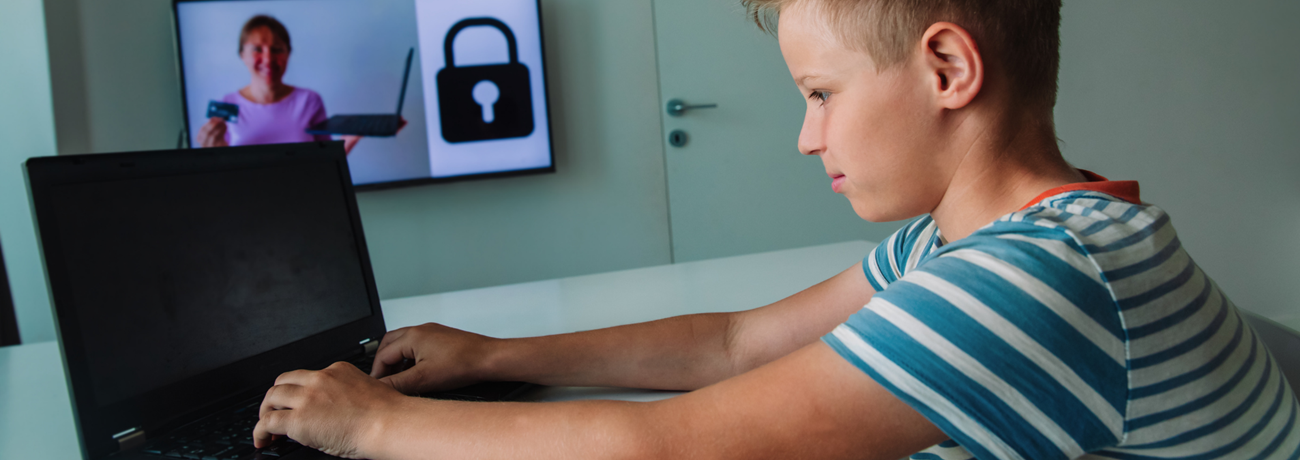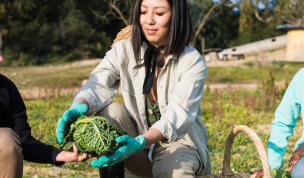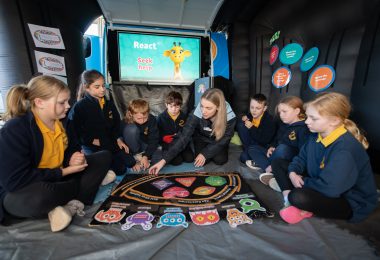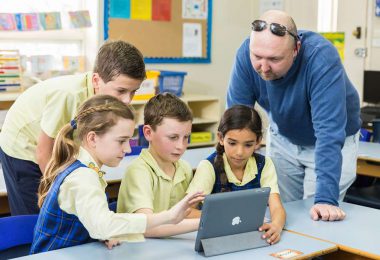Tech Tips

Technology and the internet have become an integral aspect of everyday life for kids in Australia. It is their primary source of information and preferred method of consuming media (like music, films, file sharing and games) and is increasingly a key component in their social interactions.
Because of this, it is essential that families work together to ensure that all members are practising safe, respectful and appropriate online behaviour in the home.
The following strategies have been developed to help your family achieve this:
Strategy 1: Trust & Teamwork
Create an environment of mutual trust with your child so they feel comfortable talking to you about their online experiences.
This is particularly important so your children know that there will be no punishment for speaking up about cyber bullying (whether victim or bystander). This could prevent them experiencing cyber bullying or could assist one of their friends who is being cyber bullied.
Building trust with your children can be as simple as sharing your own experiences, keeping in touch with their online activities and offering support and practical advice rather than harsh punishments.
No form of bullying is OK and should be reported to a trusted adult immediately.
Work together with your child to discuss responsible online behaviour, appropriate websites and applications
Decide together exactly what is okay and what is not okay to do online. Highlight the chat rooms and forums that are appropriate for children to participate in such as monitored chat rooms. Make sure your children avoid “.alt” chat rooms, which focus on alternative topics that may be inappropriate for young people.
At the same time, discuss the kinds of things your children can discuss online and the language that is considered inappropriate.
Be involved in how your child uses digital devices
Set up your computer in a high-traffic family area and negotiate realistic time limits with children for online activities.
Setting usage guidelines will prevent distraction at school and encourage a healthy night’s sleep, assisting a balanced lifestyle.
This can be a bit difficult if your children have their own laptops, tablets, or mobile phones, which can’t be so easily monitored. We recommend that you discuss the amount of screen time the family is comfortable with and monitor your children’s use. Balance screen time with physical activity and non-screen based activities.
Encouraging the use of digital devices in shared areas of the home area will encourage children to be more open with their online habits. With this in mind, it’s recommended that you aim to keep digital devices out of their bedrooms, especially at night time.
Consider your personal digital behaviour and work at becoming a good role model
An effective tool for influencing the relationship that the children in your household have with technology and the internet is to lead by example. Children model their behaviour from observing the actions of parents, friends and teachers so reassessing your personal use of technology can be a valuable tool in creating a safe and healthy environment. Taking the “do as I say, not as I do” approach might affect short-term behaviour but it is your behaviour more than anything which will shape your children’s attitudes towards technology.
Strategy 2: Use Online Tools
Be sure you have reputable computer security software with parental controls installed.
Try to discuss some online security issues with your children, focussing on the areas where they can contribute to making themselves safe online. Explain the reasons for wanting to use certain online tools which are designed to protect you and your family.
In addition, there are certain tasks you can undertake to ensure your family’s security. Make sure you have robust security software that protects your computer against viruses, hackers, and spyware. This software will also be able to filter offensive content, pictures, and websites.
These tools should be updated frequently, as new threats are emerging daily, so security that updates automatically is the best choice.
Learn how to report offensive content to the websites and social networks which your child is permitted to use
Search engines allow you to turn on safe searching which means that no adult content will appear within search results and all social networking sites enable users to report and/or block offensive content. After discussing what constitutes responsible online behaviour and how to deal with content that makes your children uncomfortable or upset, sit down together and go to the sites your children like to use. Go through the options and processes that they can go through in order to manage their privacy settings and report any offensive content.
It’s important to also remind your children that they can immediately seek your help if needed and that it’s okay to simply get off line and stop using the computer or digital device if they come across something or someone that makes them upset. There are links to more information about specific social networks’ security and privacy help pages in Strategy 3.
Help your children create strong passwords that are difficult to crack and change them regularly
As with your own personal passwords, teach your children that having a combination of letters, numbers and punctuation marks are the best type of passwords to use. Go through some examples with them and help them to create a password that will be fairly easy for them to remember, but still difficult to crack.–For example: a child whose name is Jack and whose favourite colour is red can be something like J@ckRed1.
Discuss with your child the dangers of sharing personal passwords or accounts with their friends and encourage them to ensure that these are protected. Remember, your password is your online digital signature and it is important that no member of your family shares or reveals this.
Discuss how comfortable all members of the family are for parents to have access to their children’s passwords and set expectations for what level of access parents will have to their children’s accounts.
Strategy 3: Stay Informed
Educate the family on the importance of online privacy and protecting their personal information.
There are a number of steps that families can take to protect their personal information. This can be as simple as understanding who can access the information that is shared online. Some social networking sites encourage users to tie their account to their real-world identity and this means that families should be vigilant with what information they choose to post on these accounts. Sharing information such as phone numbers or photos that can be used to locate or identify you in the real world (your city, school name, street signs, identifying landmarks) can expose your family to dangers. Some social networks allow you to modify or delete information which has been published about you (including removing tags which identify you or a family member within photos).
In addition to this, remind yourself that many of the people in your social networks should be considered ‘strangers’, especially those who are friends-of-friends.
Remind your children that people they meet online are strangers
Initiate conversations about how we think about friends and strangers. No matter how well we feel we know someone online or how much we have chatted to or emailed them, they are still strangers. Talk about how it is easier to give false information when talking to people online than it is in real person-to-person interactions. This can be true of people who are ‘friends-of-friends’ in your social networks.
Decide as a family the rules about opening any attachments sent by those who are not trusted family friends. In addition, discuss with your child how important it is for them to talk to you about anybody they meet online who suggests meeting up in the real world.
Talk to your children about their online reputation and how the choices that they make can follow them
When communicating online, decisions about what to post are often made in the heat of the moment and this can lead to information being shared that members of your family might regret after the fact.
Whilst it is possible to delete these posts, comments, photos or videos from personal accounts, the moment these posts are published online other users can copy or share them and your family won’t have control over what happens to them. It’s important to be aware that some Social Media sites have the right to use your information or photos collected on their site without informing you, and this may impact your child well into their adult life.
It is also important to discuss as a family that one-on-one conversations such as direct messages, texts or private chat rooms can be recorded and shared.










